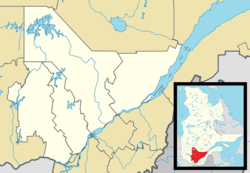Morin-Heights
Morin-Heights | |
|---|---|
 Downtown Morin-Heights | |
| Motto: L'harmonie c'est dans notre nature | |
 Location within Les Pays-d'en-Haut RCM. | |
| Coordinates: 45°54′N 74°15′W / 45.900°N 74.250°W[1] | |
| Country | Canada |
| Province | Quebec |
| Region | Laurentides |
| RCM | Les Pays-d'en-Haut |
| Settled | 1850 |
| Constituted | July 1, 1855 |
| Government | |
| • Mayor | Timothy Watchorn |
| • Federal riding | Argenteuil—La Petite-Nation |
| • Prov. riding | Argenteuil |
| Area | |
• Total | 59.40 km2 (22.93 sq mi) |
| • Land | 55.96 km2 (21.61 sq mi) |
| Population (2021)[3] | |
• Total | 4,678 |
| • Density | 83.6/km2 (217/sq mi) |
| • Pop (2016–21) | |
| • Dwellings | 2,762 |
| Time zone | UTC−5 (EST) |
| • Summer (DST) | UTC−4 (EDT) |
| Postal code(s) | |
| Area code(s) | 450 and 579 |
| Website | www |

Morin-Heights is a town in the Laurentian Mountains region of Quebec, Canada. It is west of Saint-Sauveur and north of Lachute; municipally, it is within the Regional County Municipality of Les Pays-d'en-Haut.
It is primarily a tourist town, having a large ski hill (Ski Morin Heights) that is popular during the winter months and being on a recreational trailway (the Aerobic Corridor), which is used year-round. A dense network of hiking, cross country skiing, snowshoeing and mountain biking trails surround Morin-Heights, making it the closest multi-recreational outdoor hub to Montreal (45-minute drive in moderate traffic). The old train station, on Lac Écho road, is the starting point for most recreational activities, year-round. The Rivière à Simon offers enjoyable canoeing and kayaking all the way down to Christieville and beyond.
Formerly located just south of the town was a recording studio, called Le Studio, built in 1975, which is now closed. The facility was used by numerous Canadian and international artists, including The Tragically Hip, Rush, Nazareth, Pilot, April Wine, Asia, Rainbow, Barenaked Ladies, Sting, The Police, The Rolling Stones, David Bowie, The Bee Gees, Cat Stevens, and Lawrence Gowan, as well as by Quebec artists Jean-Pierre Ferland, Richard Séguin, Lucien Francœur and Garolou. In 1994, another important music recording facility was built in Morin-Heights, on the northern edge of town. Conceived and built by Swedish-born artist Lars Westvind, Studio Nomade exclusively hosted Sarah McLachlan's recording projects up to 2000. It then was open to other artists, and is still a frequently used production facility. The town hosts a theatre company featuring mostly English-language plays, as well as a choir.
History
The first European settlers (the Seale brothers) arrived from Ireland around 1850, followed by French Canadians from Lachute, Saint-Jérôme and Saint-Eustache. In 1852, the Morin Township was formed and in 1855, the Township Municipality of Morin-Partie-Sud was established in a part of the township (the remaining part became Sainte-Adèle).[4]
The township was named after its founder and 19th-century politician Augustin-Norbert Morin (1803–1865) who had at that point a huge farm of more than three square kilometres (1.2 sq mi) on the banks of the Rivière du Nord, built around 1850–1860 and included a home, saw mill, and flour mill. An alternate, less accepted origin for the name Morin concerns an engineer named Morin who was dispatched by the provincial government to survey the region and had hired a Native American named Simon as guide, whose name was used to identify the river flowing through the township.[4]
Until 1911, the territory had just the names of Bas-Morin or Morin Flats, name of the post office between 1875 and 1911, while the railway station was known as Morin-Heights Station. In 1950, Morin-Partie-Sud changed its statutes and name to become the Municipality of Morin-Heights.[4]
The town gained notoriety in 1994 when members of the Order of the Solar Temple took part in a mass suicide, after setting fire to the ski chalet they occupied in the community.[5]
On March 12, 2008, a roof collapse in the Gourmet du Village bakery warehouse killed three women. An excessive accumulation of snow was suspected to be the cause of the accident. A total of 40 people were in the building at the time of the collapse.[6]
Demographics
| Year | Pop. | ±% |
|---|---|---|
| 1991 | 1,960 | — |
| 1996 | 2,332 | +19.0% |
| 2001 | 2,575 | +10.4% |
| 2006 | 3,503 | +36.0% |
| 2011 | 3,925 | +12.0% |
| 2016 | 4,145 | +5.6% |
| 2021 | 4,678 | +12.9% |
| [7] | ||
Private dwellings occupied by usual residents: 2211 (total dwellings: 2762)
Home language:
Education
Sir Wilfrid Laurier School Board operates Anglophone public schools:
- Morin-Heights Elementary School[8]
- Laurentian Regional High School in Lachute[9]
Morin-Heights Library serves the community.
See also
References
- ^ "Banque de noms de lieux du Québec: Reference number 42534". toponymie.gouv.qc.ca (in French). Commission de toponymie du Québec.
- ^ a b "Répertoire des municipalités: Geographic code 77050". www.mamh.gouv.qc.ca (in French). Ministère des Affaires municipales et de l'Habitation.
- ^ a b "Profile table, Census Profile, 2021 Census of Population - Morin-Heights, Municipalité (MÉ) [Census subdivision], Quebec". 9 February 2022.
- ^ a b c "Morin-Heights (Municipalité)" (in French). Commission de toponymie du Québec. Archived from the original on 1 February 2016. Retrieved 16 March 2009.
- ^ Montgomery, Marc (4 October 2018). "History Canada: October 4,1994: An international cult tragedy begins". Radio Canada International. Retrieved 7 February 2021.
- ^ "Co-workers pay tribute to roof collapse victims". CTV News. 13 March 2008. Retrieved 13 March 2008.
- ^ Statistics Canada: 1996, 2001, 2006, 2011, 2016, 2021 census
- ^ "MORIN HEIGHTS ELEMENTARY ZONE." Sir Wilfrid Laurier School Board. Retrieved on 16 September 2017.
- ^ "LAURENTIAN REGIONAL HS ZONE." Sir Wilfrid Laurier School Board. Retrieved on 4 September 2017.
External links

